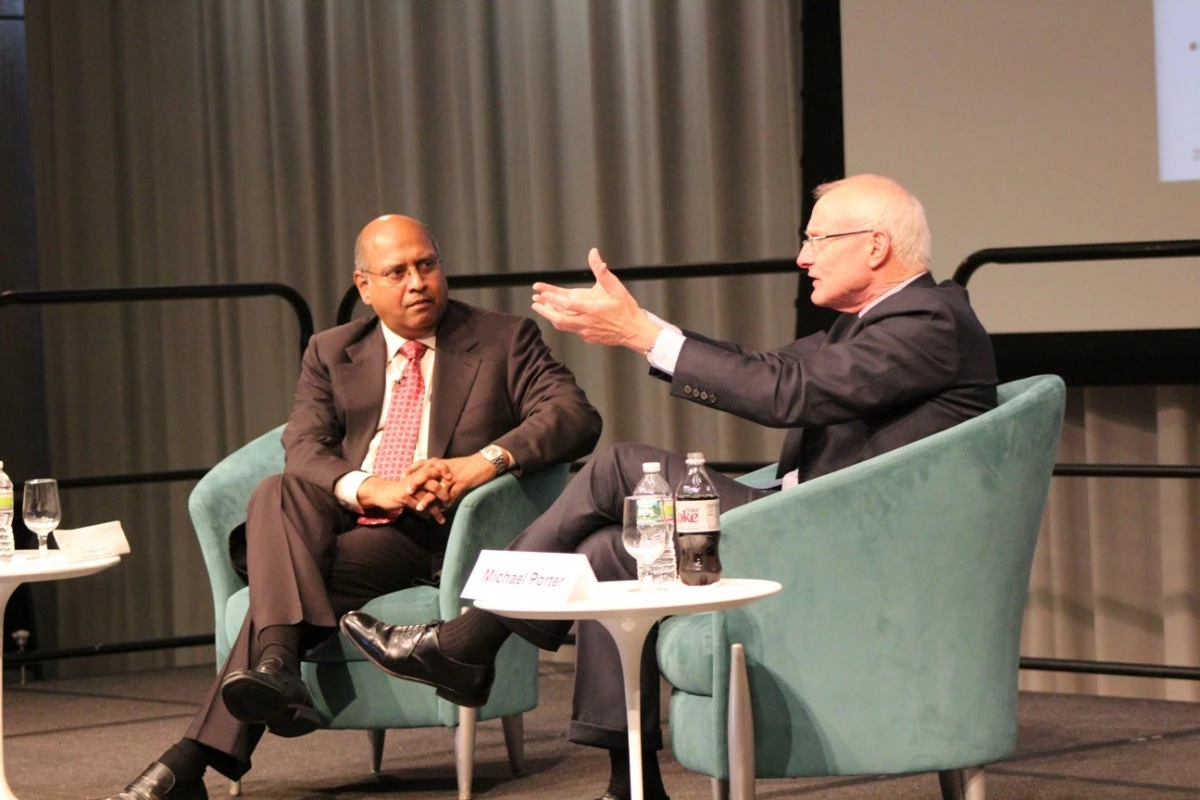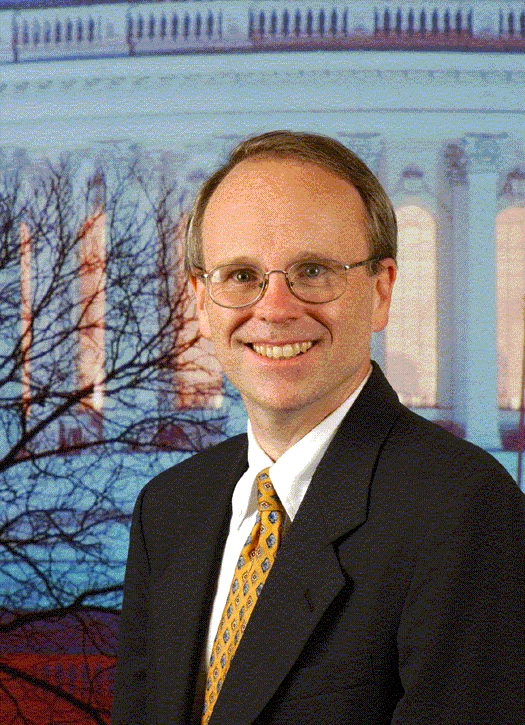Today’s sharpest business executives “don’t want to spend their life creating ‘shareholder value.’ That’s not their purpose in life. . . . They want to have a purpose. They want their company to stand for something that matters – to be ‘moving the needle’ on something important.” Just a few years ago, the idea of a business professor suggesting that shareholder value is not the be-all and end-all of corporate life might have seemed unthinkable. Yet a renowned Harvard strategist, visiting the World Bank Group last week, analyzed the private sector’s current woes and offered a way both to repair public faith in business and to constructively “reinvent capitalism.”
Creating enduring value – not just for a company’s stockholders, but for all of society’s stakeholders – requires companies to reconsider the logic of how they do business, said Michael Porter of Harvard Business School, a pioneer in the field of corporate strategy. Business leaders, said Porter, should focus on creating win-win outcomes that strengthen society as well as satisfy the profit motive. They can do so by reaching out to serve broader constituencies and by being attentive to long-term social impact.
Porter was introduced by World Bank Group President Jim Kim, who described how Porter has helped shape his thinking about what could be, “aspirationally, a science of implementation and delivery.” That new understanding can strengthen the Bank Group’s work with the private sector.
Porter pointed to an “epically important” concern: how the private sector can operate more effectively, with restored public legitimacy, after the confidence-shattering Crash of 2008. The vision of “creating shared value” could be “the next major chapter” in corporate history, he said – going beyond the outdated dogma that “the business of business is business” and the more recent doctrine of “corporate social responsibility.”
Porter’s remarks at the Bank Group were based on his Harvard Business Review article of January/February 2011: “Creating Shared Value: How to Reinvent Capitalism – and unleash a wave of innovation and growth.” Asserting that “capitalism is under siege,” the article exhorted business leaders to embrace a new concept of delivering value, and creating a profit, while delivering results that benefit society. With that article as a springboard, Porter in January 2011 led a panel at the World Economic Forum in Davos, exploring the “shared value” idea and the promise of a “new social contract.”
The questions that Porter posed – “How do we create more value? How do we create better outcomes?” – require a redefinition of the role of business in society. Amid the sharpest shock since the Great Depression, said Porter, suspicious public sentiment is now wary that “business is prospering for itself at the expense of communities” and dreads that “if it’s good for business, then we’d better be careful, because that might be bad news for us.”
Yet amid this crisis of faith in capitalism, Porter said there’s an opportunity for renewal. “Businesses can actually deliver social benefit – not in a charitable way, but through the actual core business in which they operate,” said Porter. Government, civil society and the general public should “open up our mindset and see the potential for this new opportunity.”
Porter noted that that debate over business’ responsible pursuit of its “enlightened self-interest” began many years ago – long before today’s Great Recession was triggered as the all-too-predictable outcome of laissez-faire disdain for sensible regulation or corporate self-discipline.
Porter’s reflections on “Creating Shared Value” will ring a bell in the minds of those who have followed the long-running discussion of McKinsey & Company’s “Business In Society” philosophy. Porter’s idea of “shared value” advances a similar line of reasoning.
Framing the idea as “Business In Society” rather than “Business And Society” suggests that business does not stand apart from society, but, by its nature, is embedded as one of society’s essential elements. The theory was encapsulated in a bylined article, “The Biggest Contract” , in The Economist in May 2005 by McKinsey’s Ian Davis.
“There are two sides to a contract, and business must acknowledge that in return for the ability to function, it is subject to rules and constraints. . . . Business leaders need to shape the debate on social issues much more consciously by establishing ever higher standards of integrity and transparency within their own companies and by becoming much more actively involved in external debates on issues that shape the social context of business.”
The idea of such a “social contract” has deep roots, of course: “More than two centuries ago, Rousseau’s social contract helped to seed the idea among political leaders that they must serve the public good, lest their own legitimacy be threatened,” wrote Davis. “The CEOs of today's big corporations should . . . restate and reinforce their own social contracts in order to help secure, for the long term, the invested billions of their shareholders.”
If only business and government leaders had had such a balanced perspective during the anything-goes era of Wall Street triumphalism and Washington negligence. In thrall to laissez-faire, government alas called off its watchdogs – thus opening the way toward imbalances, instability and implosion.
Porter’s “shared value” approach and the Business In Society philosophy share another building-block: re-examining our concept of “the bottom line” in creating and calculating a profit. The term “value” is often used nowadays as a genteel way of saying “profit,” without using a term that, to some, may seem crass and thus distasteful. Yet “value,” in Porter’s and Davis’ logic, connotes something more than merely the margin that’s extracted during a deal: It’s a measure of the genuine worth of the service that has been delivered. By that standard, “profit” takes on an entirely positive meaning.
As Davis puts it: Rather than dwelling on shareholder value, “it may be more accurate to describe the ultimate purpose of business as the efficient provision of goods and services that society wants. This is a hugely valuable, even noble, purpose. . . . Profits are not an end in themselves but a signal from society that a company is succeeding in its mission of providing something people want – and doing so in a way that uses resources efficiently. From this perspective, the creation of shareholder value or profits is the measure, and the reward, of success in delivering to society the goods and services we desire.”
With that positive perspective, business philosophers like Porter and Davis offer a results-focused form of capitalism that delivers socially constructive outcomes with a long-term horizon.
This line of reasoning has been steadily gaining traction throughout the Bank Group. A World Bank Institute forum on sustainable development in 2008 heard McKinsey’s Lenny Mendonca outline the strategic impact of the Business In Society approach: “The key point is for business to be an actively engaged partner in addressing social problems. And that means having business as a full participant in setting the contours of the public debate. . . . Only by putting society’s concerns at the center of corporate strategy – only by making social issues strategic – can we hope to harness all the best capabilities of the corporate, social and government sectors.”
Capitalism is now at one of its periodic break-points of change – and the World Bank Group is in a position to help guide it toward a more balanced and thus more sustainable future. Porter’s “shared value” forum reminded Bank Group staff that far-sighted business leaders must be attentive to social needs and ethical outcomes – helping inspire a responsible private sector that lives up to civic-minded ideals.



Join the Conversation